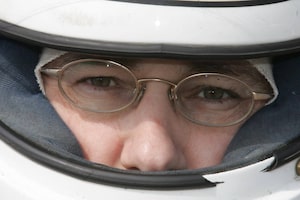NASCAR Chairman and CEO Brian France, right, and NASCAR President Mike Helton, attend a press conference at the NASCAR Sprint Cup Series auto race at Chicagoland Speedway in Joliet, Ill., Friday, Sept. 13, 2013.Nam Y. Huh/The Associated Press
NASCAR's integrity campaign died this week. It was 18 days, three hours and six minutes old.
Less than three weeks ago, NASCAR chairman Brian France reaffirmed his sport's commitment to integrity in the wake of the perceived manipulation by some teams in the final race of the regular season that set the field for the championship-deciding Chase for the Cup.
NASCAR was forced to act after it became embroiled in a scandal caused by Michael Waltrip Racing (MWR), which had one of its cars spin on purpose and then pitted another without cause late in the Sept. 9 race at Richmond, all to help its third driver, Martin Truex Jr. secure one of the 12 playoff spots in the 10-race Chase.
In the end, Truex was booted by NASCAR and replaced by Ryan Newman, the driver he knocked out. France also added a 13th driver to the Chase field, Team Hendrick's Jeff Gordon, who was pushed out of the top-12 due to the MWR manipulation.
In a press conference to announce the surprising move at the Chicagoland Speedway in Joliet, Ill., on Sept. 13, France made it clear that he was taking these extraordinary steps to protect the integrity of the series, which is the "No. 1 goal of NASCAR."
"We're going to protect, no matter what it takes, the integrity of the sport will never be in question, and that's what we're going to make sure, that we have the right rules going forward that are clear so that the integrity of the competitive landscape of the events are not altered in a way or manipulated," he vowed at Chicagoland Speedway.
To punctuate his point, France was at it again a day later, announcing a new rule that demands drivers give 100 per cent at all times during races.
So, there you have it, NASCAR will not tolerate any behaviour that erodes the credibility of the sport and tarnishes the series' reputation.
"I think it's the totality of all the different things that went on – either that were inconclusive or suspicious or whatever it might be – it was unhelpful, "France said.
"My hope is that we'll have greater, greater clarity, and we'll have that line as bright as possible because we're about delivering for our fans what they expect, and that's the best racing."
Unfortunately, that was then and this is now.
Two weeks after France told reporters that he was racing's Integrity Man, the series continued its long standing practice of letting cheaters keep wins. That happened on Tuesday, after Team Penske driver Joey Logano's Nationwide car failed to meet the minimum front car height during Saturday's post-race inspection at Dover International Speedway.
Now, we could dance around it all day but it would be hard to come up with a convincing argument that running an illegal car is anything other than trying to manipulate the outcome of a race by tilting the field in your favour.
Logano's crew chief was slapped with a $10,000 fine and the team docked six owner points, but it wasn't enough. Penske amassed 48 owner points for Logano's win and the additional 42 added to his tally after the post-Dover sanction has him first overall, 28 ahead of Joe Gibbs' second-placed No. 54 squad. Without those points, the No. 22 team would be 13 behind in second.
In addition, Logano's Sprint Cup team was one of the outfits caught up in the shenanigans in Richmond and was on probation for its involvement, so you'd assume a bigger penalty and stronger message to the repeat offender was warranted. Lastly, the Penske outfit also ran afoul of the officials earlier this year when they were caught with unapproved parts, and placed on probation.
That Penske's Nationwide outfit violated the rules just two weeks after its Cup team was placed on probation for a second time in 2013 should have factored into the punishment. Instead - and get this - the only time a previous infraction weighs on a subsequent violation is when it is for the same thing.
Essentially, as long as you don't break the same rule twice, your previous bad deeds and probation status are not taken into account when penalties are applied.
So, two weeks after saying the events in Richmond didn't allow Gordon to race for a spot in the Chase on "a fair playing field," a NASCAR driver racing for a team that is already on probation for two different infractions wins a race in an illegal car and gets the customary slap on the wrist.
It appears NASCAR feels there's a huge difference between one driver using an illegal car that gives him an advantage over entire field and having a team or teams work together to create a situation for where there may not be a level playing field for a single driver. One threatens integrity of the competitive landscape while the other, it seems, does not. You figure out which is which.
This kind of logic should not come as a shock to NASCAR fans, who have watched cheaters win countless races and not be stripped of the victories.
When asked how the series stepping in and changing the lineup for the Chase might affect the policy of not disqualifying drivers, France reasserted that the winner was the winner no matter what.
"We still stand by that basic premise that we'd like to know who the winner is Sunday night," France said.
Whether or not that happens with integrity on a level playing field appears to be irrelevant.
For more from Jeff Pappone, go to facebook.com/jeffpappone
Twitter: @jpappone
 Jeff Pappone
Jeff Pappone